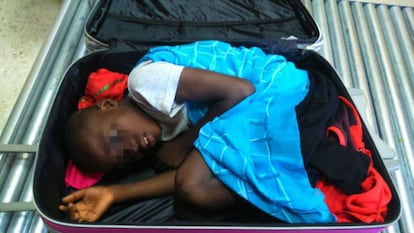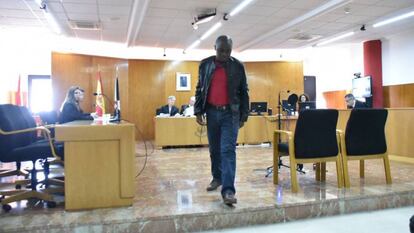Father of ‘Suitcase boy’ ordered to pay €92 fine by Spanish courts
Prosecutors wanted three years in prison for man who tried to smuggle his son into Spain in a trolley bag

On May 7, 2015, Spanish customs officials at the Tarajal border control point, in the Spanish exclave city of Ceuta, were amazed to find the silhouette of a child on their scanner. “Je m'appelle Adou” – My name is Adou, uttered the eight-year-old child from Côte d’Ivoire who was found inside a piece of luggage, and who came to be known in the media as Suitcase Boy.
On Tuesday, a court sentenced the child’s father, Ali Ouattara, to pay a €224 fine, although the amount has been reduced to €92 following a deal with prosecutors. Ouattara already spent a month in pre-trial detention over the case, and posted bail of €5,000.
Spanish authorities rejected Ouattara’s request to bring the child to Spain despite having a stable job
Ouattara was initially facing a three-year sentence, but his defense argued that he was tricked by the smugglers whom he paid €5,000 to bring the child into Spain.
The Moroccan woman who was carrying the suitcase, Fatima E. Y., was also scheduled to appear in court on Tuesday but failed to show up. She spent a year in pre-trial detention and went missing following her release. Prosecutors were seeking a six-year term for her.
The story begins in 2014, when Ali Ouattara, who was then residing in the Spanish city of Las Palmas de Gran Canaria, in the Canary Islands, began preparing a family reunification. After living in Spain for three years, he managed to bring his wife Lucie over.
Then came his eldest daughter, Mariam. Adou was still back in Côte d’Ivoire with his grandmother. Spanish authorities rejected Ouattara’s request to bring the child to Spain despite him having a stable job and a home. The government of the Canary Islands claimed that he lacked the financial resources to maintain the entire family: his income was €56 short of the official threshold.

Ouattara resorted to desperate measures. He contacted smugglers who agreed to take the child to Spain for €5,000. The original plan was to put Adou on a flight from Casablanca to Madrid, but this fell through, and Ouattara traveled to the Moroccan city. From there, father and son were taken to the city of Castillejos, where they crossed the border into Spain separately.
The young woman with a small trolley bag made customs officers suspicious when she initially refused to put the item through the scanner. Given no choice, the 19-year-old obeyed, and officials discovered Adou inside, “with no ventilation and at evident risk of suffocation,” as the prosecution described.
The woman was arrested and the child, who was unharmed, was handed over to the juvenile department of the prosecutor’s office in Ceuta. An hour-and-a-half later, Ouattara was arrested when he tried to cross into Spain. He broke down before officials and admitted that all he wanted to do was to bring his son to the Canary Islands.
The father spent a month in prison, and was released pending trial on June 8, 2015 after posting bail of €5,000. Adou spent a month at a center for minors in Ceuta until he was reunited with his mother. But the media pressure resulting from the case was such that the family left Spain and settled in France, with help from a relative. The father, however, was forced to stay behind until the courts finished dealing with the case. Once Tuesday’s decision becomes final, the Ouattara family hopes to be together again, this time for good.
English version by Susana Urra.
Tu suscripción se está usando en otro dispositivo
¿Quieres añadir otro usuario a tu suscripción?
Si continúas leyendo en este dispositivo, no se podrá leer en el otro.
FlechaTu suscripción se está usando en otro dispositivo y solo puedes acceder a EL PAÍS desde un dispositivo a la vez.
Si quieres compartir tu cuenta, cambia tu suscripción a la modalidad Premium, así podrás añadir otro usuario. Cada uno accederá con su propia cuenta de email, lo que os permitirá personalizar vuestra experiencia en EL PAÍS.
¿Tienes una suscripción de empresa? Accede aquí para contratar más cuentas.
En el caso de no saber quién está usando tu cuenta, te recomendamos cambiar tu contraseña aquí.
Si decides continuar compartiendo tu cuenta, este mensaje se mostrará en tu dispositivo y en el de la otra persona que está usando tu cuenta de forma indefinida, afectando a tu experiencia de lectura. Puedes consultar aquí los términos y condiciones de la suscripción digital.









































